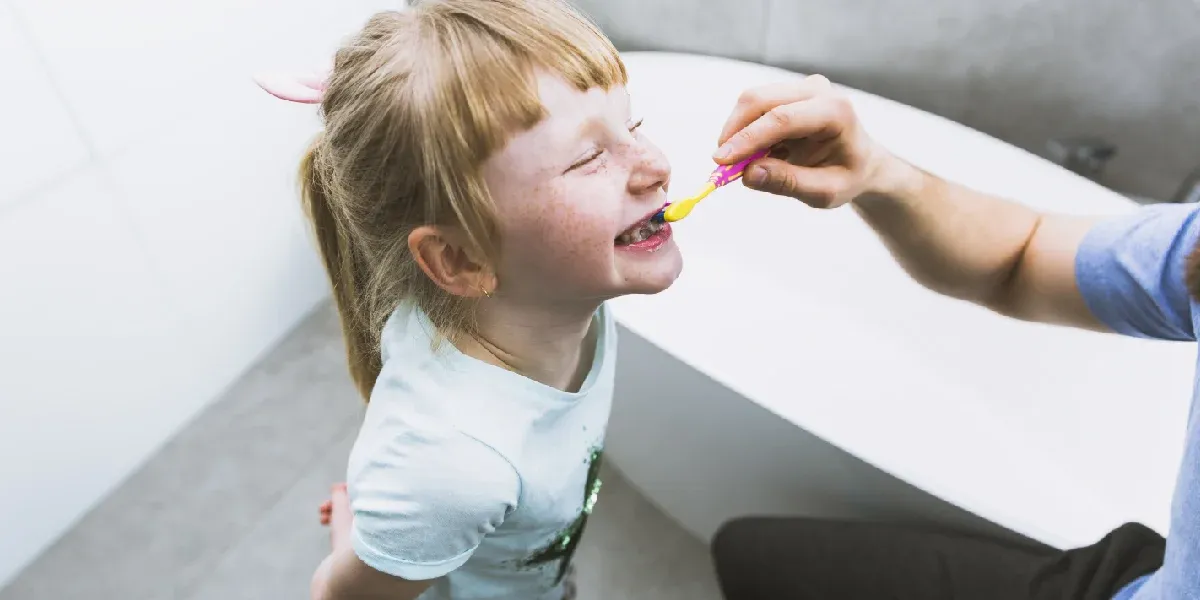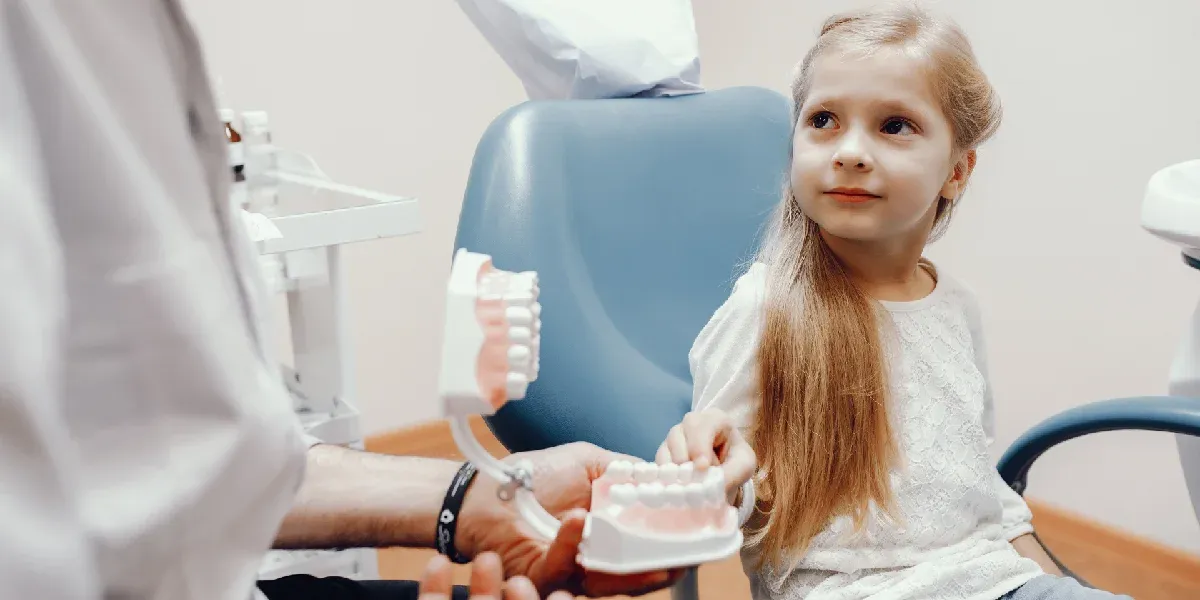
The Ultimate Guide to Pediatric Dentistry: Building a Strong Foundation for Your Child’s Oral Health
As parents, ensuring the well-being of children is a top priority, including their oral health. Creating a robust foundation for your child’s oral health is crucial for his overall well-being and establishes the groundwork for a lifetime of healthy smiles. Pediatric dentistry plays a vital role in achieving this goal.
Pediatric dentists are specially trained professionals who understand the unique dental needs of children from infancy through adolescence. Early dental care is critical in establishing healthy habits and preventing dental issues.
To ensure that your child’s oral development is on track and to address any concerns promptly, dentists recommend scheduling your child’s first dental visit by the time he turns one. It could also be within six months after their first tooth erupts.
Selecting the appropriate pediatric dentist is imperative to ensure your child’s positive and comfortable dental experience. Pediatric dentists specialize in treating children and have the expertise and gentle approach needed to make dental visits enjoyable. This guide will delve into the significance of early dental care and provide valuable insights to help you make informed decisions.
Following the advice and recommendations in this ultimate guide will empower you to actively participate in your child’s oral health journey, building a sturdy foundation to contribute to his overall well-being. Together, let’s embark on this informative and enlightening journey into pediatric dentistry that ensures your child’s bright and healthy smile for years.
“Children who receive early dental care have lower dental treatment costs than those who delay dental visits. However, according to Pediatric dentists, 5-10% of children have dental anxiety or fear, which can lead to avoidance of dental care”.
Importance of Pediatric Dentistry for Children’s Oral Health
Pediatric dentistry focuses on the unique dental needs of children from infancy through adolescence. Early dental care prevents oral health issues and establishes good dental habits. By introducing children to the dentist at an early age, parents can ensure that their child’s oral development is on track and address any concerns promptly.
Regular visits to a pediatric dentist also provide an opportunity to receive guidance on age-appropriate oral hygiene practices and preventive measures, promoting optimal oral health.
Essential Dental Care Milestones for Children
Understanding the critical dental care milestones is crucial for parents. Each stage requires specific attention, from the eruption of the first baby tooth to the transition to permanent teeth. Pediatric dentists can guide parents on what to expect during these milestones, such as teething discomfort, tooth eruption patterns, and proper oral hygiene practices.
Parents can monitor their child’s dental development and take appropriate measures to ensure their oral health by staying informed.

Building a Positive Dental Experience for Your Child
Creating a positive dental experience helps in fostering a lifelong commitment to oral health. Pediatric dental practices are child-friendly, featuring welcoming atmospheres, interactive activities, and a gentle approach.
Pediatric dentists and their teams employ effective communication techniques by using age-appropriate language and dental tools to help children feel at ease. Parents can instill trust and confidence in their children by promoting a positive and comfortable environment, making dental visits enjoyable and stress-free.
Preventive Measures for Healthy Smiles
Sealants, Fluoride, and Nutrition: Preventive measures are crucial in maintaining children’s oral health. Dental sealants, thin protective coatings applied to the chewing surfaces of molars, help prevent cavities by sealing out bacteria and food particles.
Fluoride treatments, such as varnish or gel, strengthen tooth enamel and protect against tooth decay. A well-balanced and nutritious diet is also essential for dental health.
Special Considerations - Dental Care for Children with Special Needs
Children with special needs require specialized dental care to address their unique challenges. Pediatric dentists provide compassionate and tailored dental care to children with physical, developmental, or cognitive disabilities.
Children with physical disabilities may face limited mobility and positioning challenges during dental examinations and treatments. Developmental disabilities can present communication barriers and behavioral issues during dental visits.
Pediatric dentists receive specialized training to provide dental care for children with special needs. They employ a multidisciplinary approach, collaborating with healthcare professionals to ensure comprehensive care. Pediatric dentists may modify treatment techniques and utilize adaptive tools to accommodate the unique needs of each child.
Creating a calming and sensory-friendly environment can help children with sensory sensitivities or anxiety feel more comfortable during dental visits. Pre-visit communication and social stories can help prepare children with developmental disabilities for dental appointments.
Sedation or anesthesia may facilitate dental treatments for children with special needs. Parental involvement and support are crucial in maintaining oral hygiene practices at home and ensuring regular dental visits.
Building a Sturdy Foundation for Your Child’s Oral Health Needs
Building a long-lasting foundation for your child’s oral health needs is essential for his overall well-being. You can generate healthy smiles by establishing good oral hygiene habits and providing proper dental care from an early healthy smile. Here are some crucial steps in this regard.
Start Early
- Begin caring for your child’s oral health before the eruption of their first tooth.
- Clean their gums gently with a soft, damp cloth after feedings to remove bacteria.
- When the first tooth emerges, initiate brushing using a small, soft-bristled toothbrush specially designed for infants.
Implement Proper Oral Hygiene Practices
- Brush your child’s teeth twice daily using a pea-sized amount of fluoride toothpaste.
- Teach him how to brush correctly, covering all surfaces of the teeth and gums.
- Also, encourage him to spit out toothpaste but not rinse with water to allow the fluoride to work.

Make Brushing Fun
- Use colorful toothbrushes with their favorite characters, or let them choose their toothbrush.
- You may use a timer to make brushing for two minutes enjoyable.
Promote Healthy Eating Habits
- Limit sugary snacks and beverages, as they contribute to tooth decay.
- Encourage a nutritious diet rich in fruits, vegetables, whole grains, and lean proteins.
- Offer water instead of sugary drinks between meals to help rinse away food particles.
Introduce Dental Flossing
- Start flossing your child’s teeth when two teeth touch each other.
- Use child-friendly flossing tools, such as floss picks or floss holders, to make it easier for both of you.
- Teach the child the proper flossing technique, gently guiding the floss between their teeth and along the gumline.
Schedule Regular Dental Check-ups
- The American Dental Association recommends a dental visit by the child’s first birthday.
- Regular dental examinations allow early detection of any dental issues and provide preventive care.
Encourage Healthy Habits
- Limit thumb sucking or pacifier use beyond the age your dentist recommends.
- Discourage nail biting, as it can lead to oral health problems.
- Promote wearing protective mouthguards during sports activities to prevent dental injuries.
Teach the Importance of Oral Health
- Educate your child about the benefits of a healthy smile and reflect on the importance of oral health.
- Encourage him to take ownership of his oral hygiene routine.
- Educate your child about the consequences of poor oral health functioning, such as tooth decay and gum disease.
Be a Role Model
- Practice good oral hygiene yourself to set an example for your child.
- Let your child see you brushing, flossing, and maintaining regular dental check-ups.
- Demonstrate a positive attitude towards dental care to help alleviate your child’s fears or anxieties.
Following these steps and consistently prioritizing your child’s oral health can build a strong foundation for his dental well-being. Remember, establishing good oral hygiene habits and providing regular dental care from an early age ensures a healthy smile and promotes overall health and self-confidence for your child as they grow.
Final Thoughts
Parents can promote their child’s oral well-being by understanding the significance of early dental care, addressing unique dental milestones, creating positive dental experiences, implementing preventive measures, and considering special needs.
Pediatric dentistry sets the stage for a lifetime of healthy smiles. Early dental visits allow for monitoring oral development, preventing dental problems, and establishing healthy habits. Parents can access expert guidance on age-appropriate oral hygiene practices, nutritional recommendations, and strategies to make dental visits enjoyable by partnering with pediatric dentists.
Contact Stockton dentist for kids, Sajjad Rizvi DDS, at Happy Kids Dental today to know more about The Ultimate Guide to Pediatric Dentistry: Building a Strong Foundation for Your Child’s Oral Health.
Resource:
Caring for your child’s Oral Health
*This media/content or any other on this website does not prescribe, recommend, or prevent any treatment or procedure. Therefore, we highly recommend that you get the advice of a qualified dentist or other medical practitioners regarding your specific dental condition*
Subscribe To Our Newsletter
Get Updates And Learn From The Best


